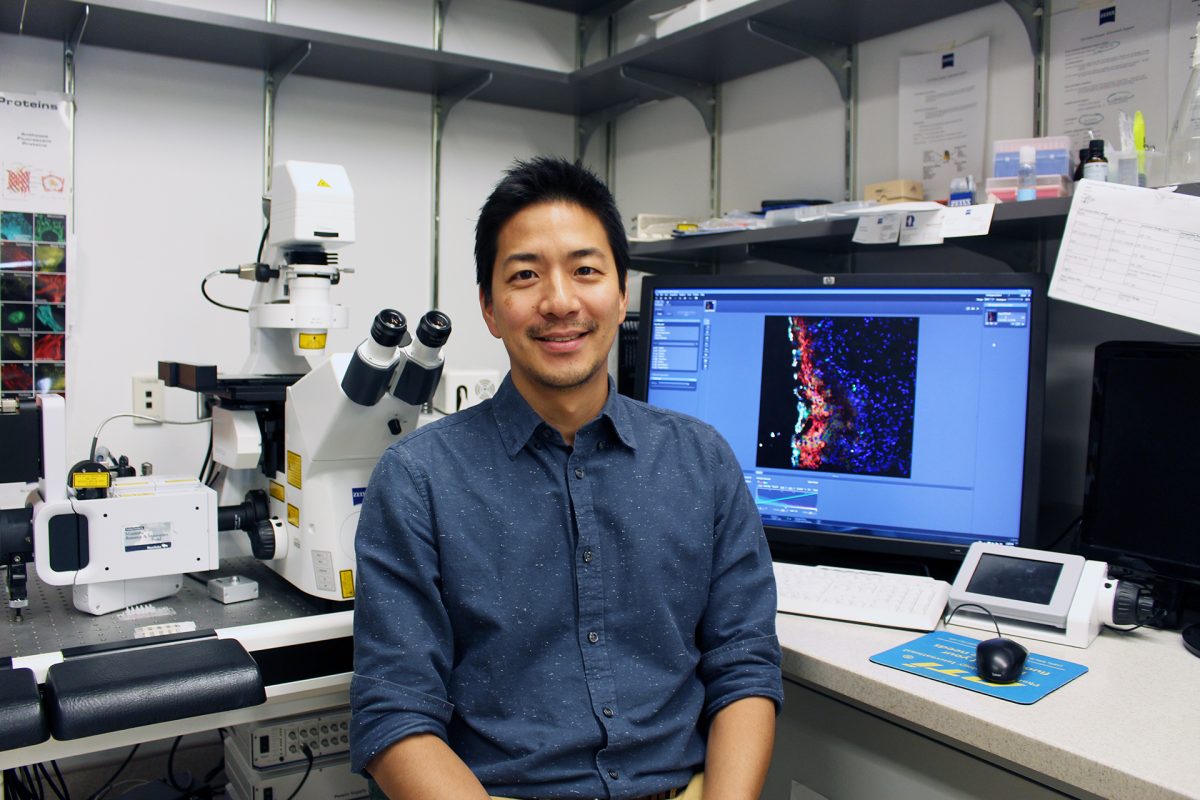
Murooka’s research looks at how HIV is transferred from one cell to another and how communication between cells is affected due to the virus.
U of M researcher advancing HIV knowledge one cell at a time
Dr. Thomas Murooka is using his expertise in the study of how cells communicate with each other to advance the body of knowledge around HIV, hoping that one day it will help lead to a cure.
Murooka, assistant professor of immunology and medical microbiology/infectious diseases (MMID), and GSK Chair in Immunology and Infectious Disease, was born in Seattle and raised in Vancouver. He earned his B.Sc. in microbiology/immunology at the University of British Columbia where he was especially drawn to the immunology component of his degree, particularly microscopy, and went on to complete his PhD in immunology at the University of Toronto.
From there he moved to Boston to complete a postdoctoral fellowship at the Massachusetts General Hospital, studying how HIV infection changes the way cells move by observing how cells interact with each other in live tissues using a technology called intravital microscopy.
Murooka was able to carry over some of this research when he started at the University of Manitoba Max Rady College of Medicine in 2014, which at the time was the only place in Canada that had a two-photon microscope within a biosafety containment level 2+ for work with HIV infected materials. The close partnerships between the departments of immunology and MMID and the J.C. Wilt Infectious Diseases Research Centre were other draws for Murooka.
“There’s a very strong and unique HIV research group here in Winnipeg, I would argue that it’s one of the strongest in Canada,” he says, “There’s a very strong focus on understanding the molecular and genetic factors that control HIV transmission, clinical epidemiology and various cure and preventative strategies.”
The bulk of Murooka’s research, funded by a Canadian Institutes of Health Research (CIHR) grant of $573,752 awarded last year, is looking at how HIV is transferred from one cell to another and how communication between cells is affected due to the virus.
As he explains, a crucial component of the immune system is that “cells bump into and talk to each other.” HIV does not have a way of moving so it must exploit this communication and use it “to hitch a ride” from one cell to another. Murooka wants to figure out what mechanisms lead to transmission.
“What is it about these two cells bumping into each other that actually leads to increased HIV spread? Is it just them bumping into each other, or are there actual communications between these two cells that can signal the other cell to become more infected?”
This is one of the components of a five-year CHIR grant recently awarded to a team of researchers across Canada, including Murooka, which make up a consortium called the Canadian HIV Cure Enterprise (CanCure 2.0). Murooka’s lab will also focus on how cell-cell communication affects a phenomenon called latency, where HIV becomes dormant in cells. The goal is to figure out how to completely get rid of HIV in the body by waking up the dormant virus in the cells so that other drugs can eliminate it.
So far the drugs developed for this purpose, called latency reversing agents (LRAs), have been unsuccessful in clinical trials, so this team of researchers is going back to the drawing board.
“If we can understand who harbors the virus and how it can remain dormant, maybe we can reverse it.”
Their plan is to use LRAs along with a combination of other strategies developed by Canadian researchers to try to yield a better result.
Murooka says studies like these are important because while there have been improvements in HIV treatment and prevention, the reality is that people are still getting infected. He hopes his work will contribute to the understanding of what makes the virus so infectious, how it has evolved to be so successful in evading the immune system, and identify certain vulnerable points that can be targeted using drugs.
“It’s going to be a team effort and global effort. If each of us can make an incremental advance, you can advance that collective knowledge to hopefully completely eliminate this virus.”
Murooka is also working with MMID department head Keith Fowke [B.Sc.(Hons.)/88, PhD/95] and obstetrics and gynecology associate professor Adam Burgener [B.Sc.(Hons.)/99, PhD/05] on their recently awarded CIHR team grant on HIV prevention.
The department of immunology will host its 50th anniversary celebrations on September 26 and 27, 2019. The theme is: Immunology: Translating Creativity into Better Health. For more information, please visit the department of immunology website.






